In conversation, via Facebook Messenger, with Phil DeWalt, I recalled that odd 45 rpm 7 inch single in its plastic covered, crudely printed sleeve, with its plain white label, stamped in stamp pad black ink — if memory does not play its usual tricks — with the words Peace & Love, and the name of the artist, John Trubee. The contents, when spun on the nearest turntable, blew my young mind. Here was an obvious bit of spoof of the ‘song poem’ industry. That was a peculiar, Nashville-based branch of the music business which those of us looking to, you know, actually sell songs and become known — ok, well known… ok, you win… famous! — had been trained by reading the Songwriters Market and This Business of Music, to avoid as if infected with the hoofus-goofus. Here was someone who had deliberately waded into this Nashville swamp, sending a poem so vile, so demented, and yet so descriptive of the famous counter-culture experience of psychedelia, that it put to the test the ‘professionalism’ of those who actually were on the business end, the producing, ‘artistic’ end of the scam. Would they be able to rise to the occasion, and if so, what would the resulting output be? The result was jaw dropping, primarily, but also, brilliantly funny. It was never lol funny. It was always met with a gasp of astonishment. It was not so much a response/reaction to the music, per se. The music was lame by any standard. It was a response to the idea that a scam could be turned on itself to make a kind of found art. It was here that the ideal formed in my mind, based on a spoof of all of it, the music business, the art-making enterprise, the futility of aesthetics, over which so much anxiety had been produced, words slung about, exchanges heated up and boiled over… feuds waged for years if not decades… but, also, taking a title directly ‘off the charts,’ mid-80s, and… by changing ONE LETTER… I emerged with the concept, ‘bad songs say so much.’ All I had to do was turn myself to writing them.
So having mentioned Trubee to DeWalt, I was compelled to, at the first opportunity, Google the man, the song, and their fates. The results, again, blew my aging mind. In the intervening years, this particular song poem, song poems in general, the songs made into artifacts from the poems, and Trubee himself, to a certain extent, have all accreted notice on the inter-webs. I’ll note a few here, with some comments/commentary:
John Trubee at Zappa Wiki Jawaka
This entry, and this wiki itself, are representative of the info about Trubee that’s out there, while at the same time hinting at the fragile nature of links floating on the web. This will be true of all the links I establish here as sort of a beachhead: they may be gone tomorrow, or they may persist as archival traces, or they may wave like flags — long, though somewhat short of eternal. It is what it is. I am typing about them in the order in which they appear on this date, July 28, 2022. If a better order occurs to me in the course of the typing I’ll go with that. If I don’t finish the typing now, I’ll resume this process, or some other process, when (or if) I get back to it. How’s that for fastidious?
I love Discogs. That’s not to say I like shopping on Discogs very much. My ability to actually obtain things I attempt to purchase here is limited, the results coming in at something like 50/50. But as discography in the wild of the real world, it’s hand-dandy. Scroll down, and you get to ‘Blind Man’s Penis’ in its various forms as a single. Dig a little deeper and you get to this. This is the one that DeWalt had, and likely still has. Phil? You do still have it, don’t you? Anyway… it’s this one that I made a tape copy of. I’d have to do some digging to locate my tape copy. And why do that, when there are plenty of readily available versions on youtube and elsewhere? Read on, and you will learn of more stuff worth digging for…
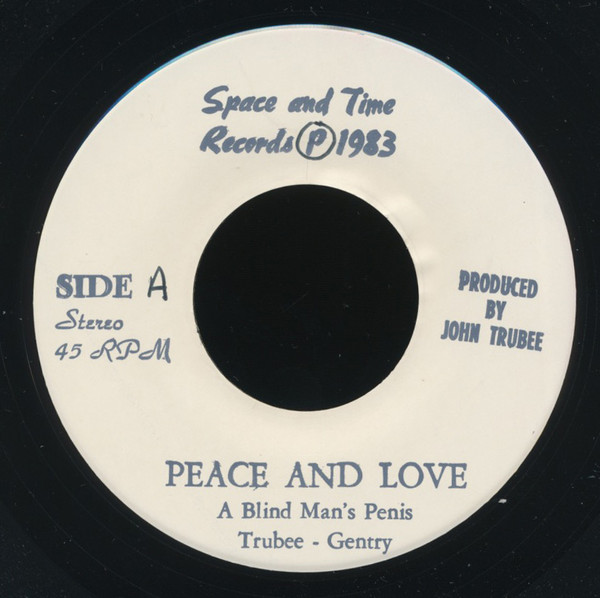
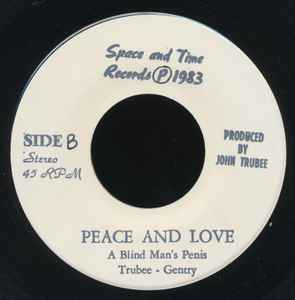
Side B was, if memory serves, JUST the backing track, no vocal. Side A was extreme stereo; the vocal on one channel, the instrumental on the other. The early ‘stereo’ Beatle records had the same format. Be your own balance engineer!
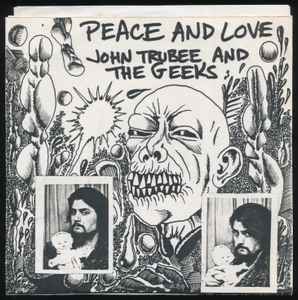
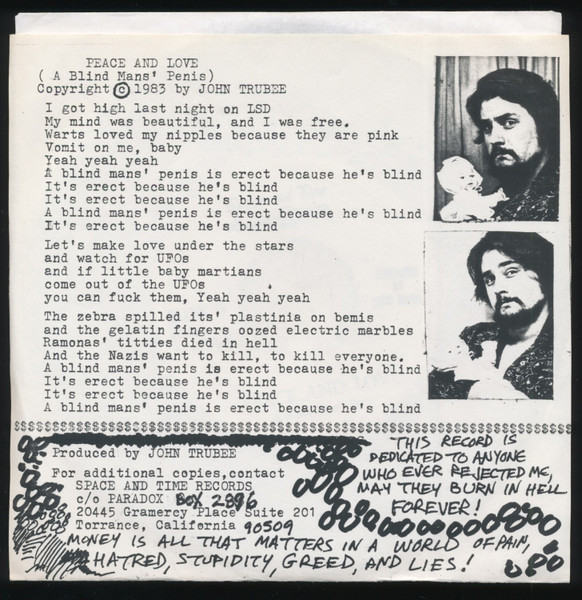
The back cover featured what I took to be the artists’ address. I wrote Trubee some fan mail, perhaps the first time I had ever done such a thing. To my astonishment, he wrote back. His reply would be worth looking for. If I find it, I’ll amend this rant to include it. I don’t think it was terribly personal or any more ‘offensive’ than the single itself. And, by the way, there, in all its glory is the song poem. Everyone, including Trubee, especially Trubee, in Spin allegedly, notes that the original poem as submitted, specified the penis as being Stevie Wonders. Ok. It got changed by the ‘producers’ of the ‘product.’ No consult. No fee.
BTW, these images came from the Discogs informational listing of the product. Someone is allegedly selling a copy for $40. Good luck with that. I won’t be attempting to buy it.
And of course, there’s a Facebook page. Enter at your own risk! And, though I’m not going to link them, there is a presence on Band Camp, Twitter, and many other forms of social media. But I will observe that THIS is the essence of what blows my mind about this song and its fate, these nearly 40 years on: the underbelly has intersected with the culture at large, and made a bit of a penis sized dent, I dare say. Perhaps one must go looking for it, and won’t be hit over the head with it, but there it is. Ubiquitous as an underbelly item can really get. Not at all bad for a song poem.
I’m not the only one writing about this. No no no. Here’s somebody else blogging about it. See what I mean? It’s part of the Zeitgeist at this point. ‘Nice work, if you can get it.’
At long last, somewhat down the list of hits, and having now switched to Googling ‘John Trubee Blind Man’s Penis,’ we get to my favorite bit of internet flotsam regarding this piece. The site is, appropriately, called genius.com. It is, on the surface of it, yet another discographic site, dealing with all sorts of musical acts, with a focus on song lyrics. But therein is this discussion of the song, once you scroll down past the obligatory reprinting of the lyric. And embedded in that paragraph or two is a link to the American Song-Poem Music Archive, and the article there on this most famous example.
The article in Spin cited in the genius.com link has an interesting history of its own. Here’s a pretty concise explanation of how/what this is. There’s also audio with still photos of this interview on youtube here.
That’s a bunch of links, I know. And as noted… links have the permanence of a ghost in a mirror. So let me summarize and pontificate for posterity, or at least as long as I can afford to keep the lights on here at Beck’s Good Whatever. Trubee, working at a convenience store and going crazy due to the hours of boredom and, presumably, moments of terror, had the habit of passing time by writing poetic scraps on bits of paper. Sometime in 1976, Trubee was reading a copy of the tabloid Midnight Globe. In the back of the tabloid was an ad such as this one:
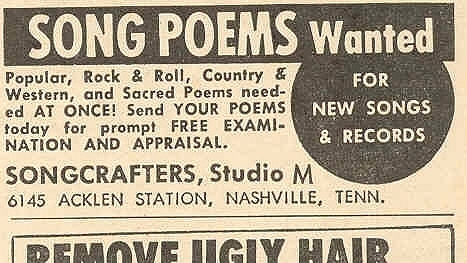
And to quote Trubee, “I scanned the geeky little ads and saw: “Cowrite on a 50-50 basis, earn $20,000 royalties, send your song poems to …” some outfit in Nashville, Tennessee. I thought to myself: wouldn’t it be fun to send these people the most ridiculous, stupid, vile, obscene, retarded Iyrics to see their response?” He then wrote the song lyric we know and admire, with the line in the hook referring to Stevie Wonder’s penis.
Do go on, Mr. Trubee:
“I wanted to get an emotional letter from the jerks in Nashville. I wanted them to tell me I was crazy. I wanted them to curse me out in writing so I could show all my friends.”
“Several weeks later I received a letter from Nashville Co-Writers which began:
‘Dear John,
We have just received your lyrics and think they are very worthy of being recorded with the full Nashville Sound Production. … I am enclosing a contract of acceptance. Please sign and return along with $79.95 to cover the cost for each song to be completed …‘”
(John Trubee, quoted at The American Song-Poem Music Archive)
“Aha! They wanted my money. I knew it! But if I send them the money, they would send me a tape and a record of my lyrics set to music. Although $79.95 was a lot to a minimum wage teenager, I signed the “contract of acceptance” and returned it with a check. Several weeks later I received a 7-inch, 45 RPM record that had a label and grooves only on one side. Typed on the white label was “Peace & Love” (John Trubee-Will Gentry). I immediately rushed upstairs and put this little gem on the turntable for a listen. Over the lamest, most minimal country track was some country hack singing the lyrics I wrote. I was stunned.”
“Also enclosed with the disc (actually an acetate) was a photograph of Ramsey Kearney, the guy who sang the damned thing. Wearing a butterfly-print polyester shirt, Ramsey looked like the perfect man to sing these demented lyrics.”
“Several weeks later, Nashville sent a teeny 3-inch tape reel of the song in extreme stereo — one channel had only the prerecorded rhythm track while the other channel featured Ramsey singing those idiot lyrics with a little slap-back echo thrown in.”
(op cit.)
Trubee then goes on to describe how the single came to be released.
What fascinates me now, more than anything, are the twin amazements that this madness is still circulating, and that it is so easy to call it up on the web. At the time the work was made, from inception to conception, from deception to delivery, there was no social media. In the famous Pete Seeger story about the wise men, sent on a mission by a bored king to find the worlds wisdom in a single sentence (‘this too shall pass’), and then in a single word (‘maybe’), YEARS pass as they search. The king forgets what he sent them off to find! Their beards are dragging on the ground when they return, aged and stooped! These days, it would only take a few seconds. What are we doing with our riches, in this, the information age? We are making stuff up! Reality, searchable and verifiable, is not enough! We seem to need conspiracy theories to spice things up. Conspiracies exist aplenty. These can be proven to exist, and are not sufficiently outlandish. No. We need the theoretical conspiracies to make sense of our pitiful beliefs for ourselves.
And all the worlds wisdom, or at least all of humanity’s art, is available at the click of a button, a tap on a tablet, a shake of the wrist. And not simply the highest, most exalted forms. We can also bask in the lesser glories of outrage, spoof, and mockery. And we do, we do.
This, Ken, is the kind of activity retirement was created for. Any time I ever registered a song for copyright I always got a solicitation in the mail 4 weeks later saying my poems were needed and their firm would be pleased to produce a demo of my songs.
I certainly agree that retirement affords me the opportunity to go where opportunity takes me, (for excample, Synth Battle Royale on aNONradio), particularly retiring from a public institution like the University of Illinois, where they were hyper-sensitive about public perception, image, and information security.
OTOH, the song-poem concept is not quite the same as song demos for hire or on demand. I’ve always been happy to make my own demos; often that’s the only hearing on of my ‘bad songs’ is going to get. They are not made to fit a mass market, or any market. That’s what’s so remarkable about ‘Peace & Love.’ It was meant as a spit in the face and it ended up with a following.